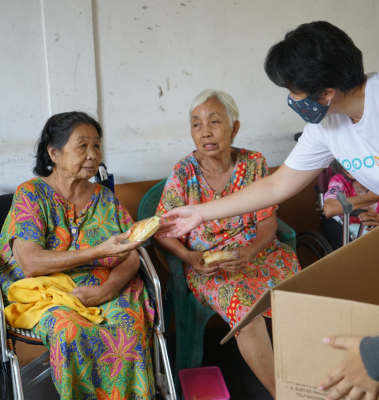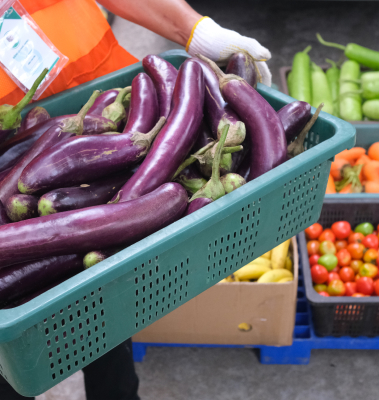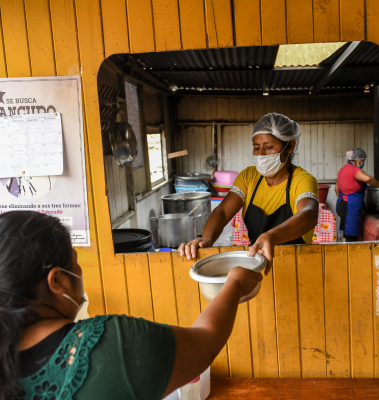01
A Message from our CEO
“We know that the coming year will continue to present serious challenges, but I’m confident that The Global FoodBanking Network and the Network of strong, innovative food banks will continue to meet those challenges by transforming our food systems and building resilient communities.”
02
Mission & Vision
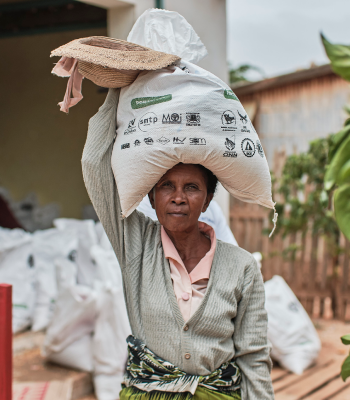
Zeheregna Armeline, a farmer and mother of eight, receives food from Banque Alimentaire de Madagascar. Drought in recent years has made farming difficult and exacerbated food insecurity. (Photo: The Global FoodBanking Network/iAko Randrianarivelo)
To nourish the world’s hungry through uniting and advancing food banks.
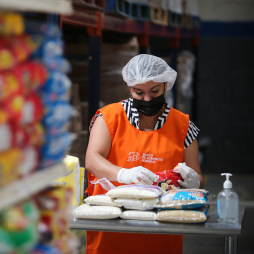
A volunteer from Banco de Alimentos de Honduras repackages food for distribution at their warehouse in Tegucigalpa. (Photo: The Global FoodBanking Network/Delmer Membreño)
A world free of hunger.
03
Our Impact
FY2022 closes out the ambitious three-year strategy we launched in 2019.
This plan set out our North Star goal of food banks serving 50 million people facing hunger by 2030, a goal that continues to center our work. The FY2020-2022 strategic plan focused on three key areas: expanding food relief, strengthening food banks, and partnering to address the root causes of hunger and food loss and waste.
When we set our three-year strategy, we could not have anticipated the challenges the world, and the Network, were about to encounter—challenges that have influenced and shaped the way we operate and increased the demand for food bank services.
In the face of the COVID-19 pandemic and spiking global food prices, GFN member food banks have remained steadfast in their commitment to serving their communities. We celebrate the end of this three-year period with a GFN that is stronger and larger, but our dedication to our mission and vision is unchanged.
Learn more about the birth of the FY2020-2022 strategic plan.Expanding Food Relief
In FY2022, GFN member food banks served 128 percent more people than in pre-COVID times.
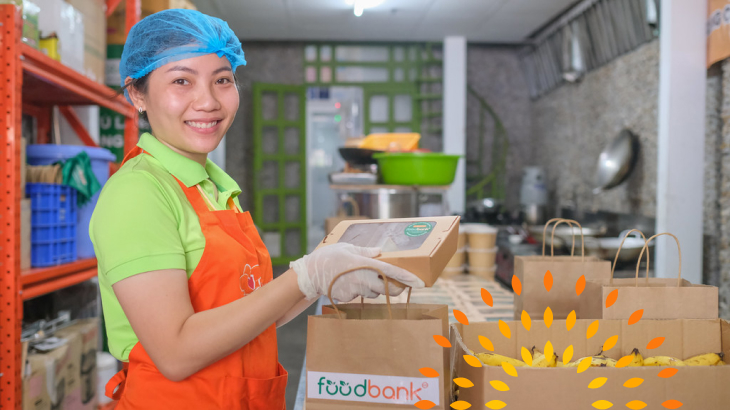
STRENGTHENING FOOD BANKS
Our organization derives its strength from individual food bank members; to make sure we’re providing the most relevant and useful services to support their aspirations, we rely on continual feedback. One way we evaluate our efforts to strengthen food banks is through our annual member satisfaction survey. The feedback that we glean from this annual examination is critical to the future of the Network and better shapes our vision and strategy.
Partnering to Address the Root Causes of Hunger and Food Loss and Waste
To support food banks in sourcing nutritious food and grocery products, and ultimately reduce food loss and waste, we committed to building more partnerships with multinational and regionally based businesses across the supply chain, from farms to retail and food service outlets. Our growing product sourcing team led this work in FY2022.
Learn more about our goal to partner to address the root causes of hunger“ General Mills is proud to have partnered for over 15 years with The Global FoodBanking Network. We believe deeply in the power of food banks to alleviate hunger while reducing food waste. As food insecurity impacts people in every global region, food banks are vital to nourishing more people in need.”
04
Our Work in FY2022
Throughout the challenges of FY2022, dedicated staff at GFN ensured that food banks had the resources to operate, expand, and respond to emergencies through specialized technical assistance, increased funding, and enhanced knowledge sharing. Here are some of the ways we supported food banks this year.
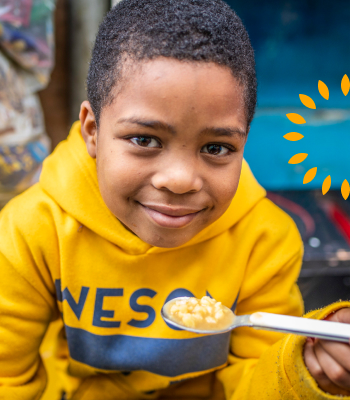
A boy in temporary care at Solomons Haven eats lunch provided by FoodForward South Africa. The organization cares for children placed in care by the Department of Social Development and its affiliates. (Photo: The Global FoodBanking Network/Anna Lusty)
Strategic Grantmaking:
What We’ve Learned
In response to COVID-19, GFN dramatically expanded grantmaking initiatives to support food banks. This included investments in food storage, cold chain supplies, food procurement, staffing, emergency response funding, and various other resources. Through our strategic grants program, we have built reputable partnerships with major donors, resulting in multi-year commitments to help food banks grow and sustain for the future.
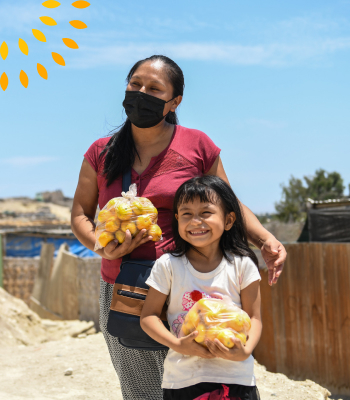
Jessica Tello Quispe and her daughter Katherine receive a bag of food supplies from ESMIRNA soup kitchen, a community organization supported by Banco de Alimentos Perú. (Photo: The Global FoodBanking Network/Nicolas Villaume)
food bank organizations
in
countries
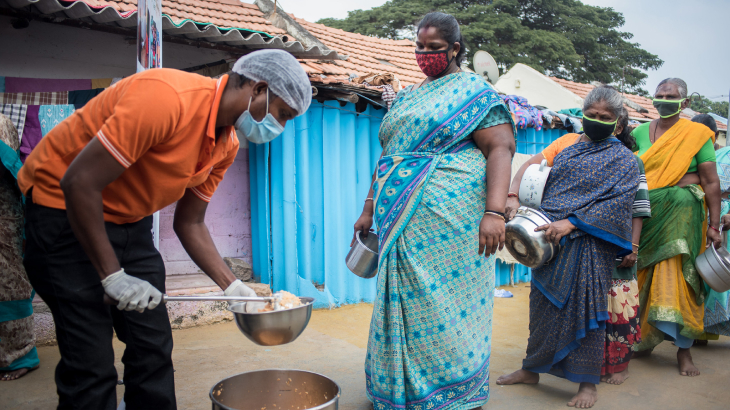
Community members in Sowripalayam, India, receive a nutritious meal prepared by No Food Waste's People's Kitchens. (Photo: The Global FoodBanking Network/Narayana Swamy Subbaraman)
disbursed to food banks
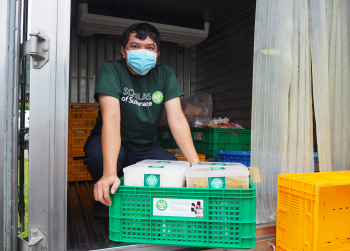
Sawaeng Kaola, one of SOS Thailand's Food Rescue Managers, distributes surplus food to people in Phuket, Thailand. (Photo: Scholars of Sustenance Thailand)
Using funding from GFN, Scholars of Sustenance Thailand (SOS) expanded food recovery efforts and scaled service delivery in Bangkok, Phuket, and Hua Hin, through partnerships with local retailers and the addition of a refrigerated truck. In November 2021, SOS used GFN grant money to launch their first operations in the northern region of Chiang Mai, partnering with five new agencies to support efforts in that community.

Sawaeng Kaola, one of SOS Thailand's Food Rescue Managers, distributes surplus food to people in Phuket, Thailand. (Photo: Scholars of Sustenance Thailand)
Using funding from GFN, Scholars of Sustenance Thailand (SOS) expanded food recovery efforts and scaled service delivery in Bangkok, Phuket, and Hua Hin, through partnerships with local retailers and the addition of a refrigerated truck. In November 2021, SOS used GFN grant money to launch their first operations in the northern region of Chiang Mai, partnering with five new agencies to support efforts in that community.
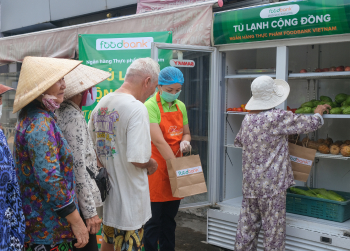
Community members wait in line to select food from Foodbank Việt Nam’s Love Fridges. (Photo: The Global FoodBanking Network/Hoang Viet Nguyen)
In FY2022, Foodbank Việt Nam (FBVN) provided services in new, high-need areas, including Dong Nai and Ben Tre provinces, and increased coverage in Ho Chi Minh province, thanks to GFN grants. FBVN used the financial support from GFN to increase cold storage in their existing facility and build “miniature” warehouses throughout the region.
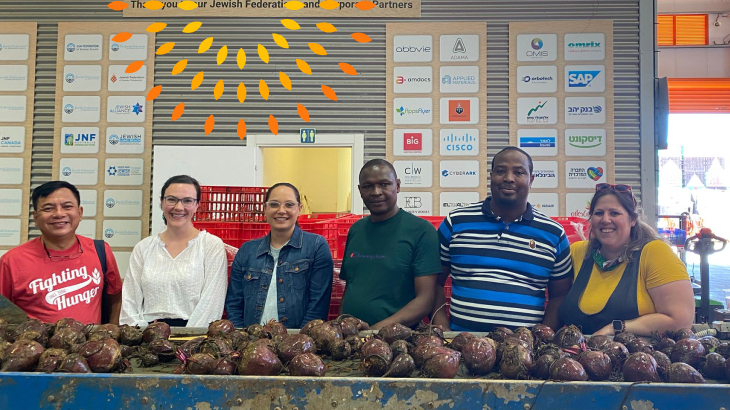
During a Knowledge Exchange experience hosted at Leket Israel, GFN staff members Marta Hodgkins-Sumner and Ahlea Isabella and GFN member food bank founders Jomar Fleras (RAHP), John Gothangu (FBK), and Elijah Amoo Addo (FFAA) toured Leket Israel's robust logistics center. The Knowledge Exchange provided an in-depth look at Leket’s agricultural recovery program. (Photo: The Global FoodBanking Network)
Knowledge Sharing: Powering Communities for Zero Hunger
Throughout FY2022, we continued to support food banks as they addressed the challenges of supply chain fractures, decreased food donation, surges in demand for food assistance, and spikes in food prices, using well-established knowledge sharing platforms like the Food Bank Leadership Institute, the regionally specific Incubator Programs, and the newest platform, the Latin American Knowledge Networks.
As international COVID-19 restrictions eased in the second half of FY2022, GFN staff began to take the opportunity to safely visit member food banks again, providing in-person technical assistance in areas like food safety, logistics, and financial management.
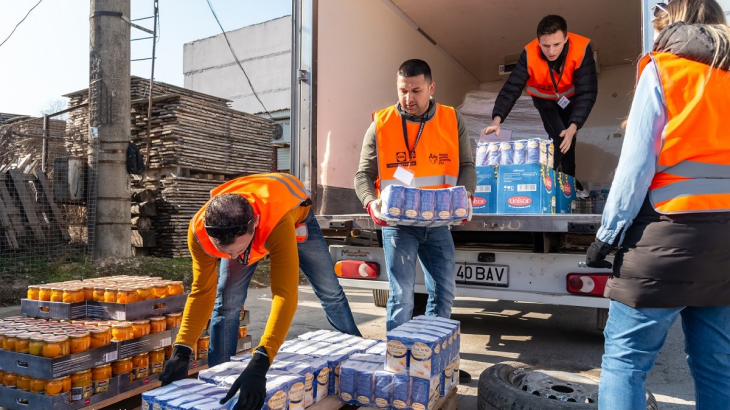
Staff from Banca de Alimente Moldova, a FEBA food bank, receive food donations as demand for food increases. (Photo: Banca de Alimente Moldova)
Emergency Response: Food Banks in a Time of Crisis
The invasion of Ukraine by Russia in late February 2022 forced millions of people from their homes, leaving them with little reliable access to food. The ripple effects of the conflict have been felt across the globe. Many countries, especially in Africa, rely on wheat, fertilizer, and other commodities from Ukraine and Russia but are now facing shortages because of the war. And food prices reached their highest in a decade shortly after the invasion, exacerbating the toll of the pandemic on people in vulnerable situations and leading to the greatest cost-of-living crisis in a generation.
raised to support Ukraine emergency response in Europe
GFN and member food banks responded to this crisis rapidly and efficiently. In partnership with the European Food Banks Federation (FEBA), we created an emergency response fund that supported the food banks in and around Ukraine, which provided crucial emergency food assistance, and we continue to partner with FEBA and food banks in the region in their ongoing response.
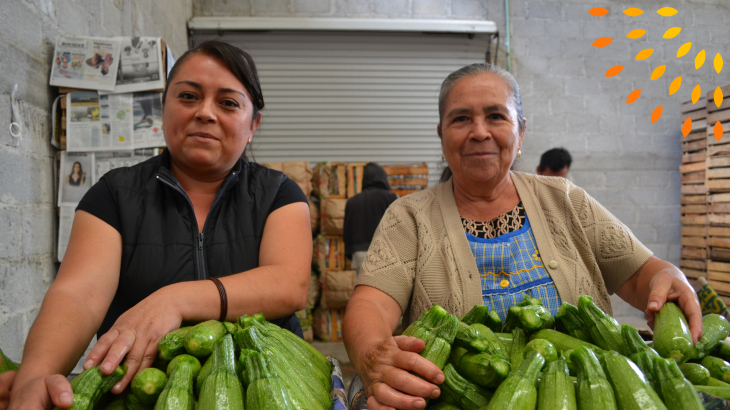
Women collect zucchini for distribution as part of BAMX's Campo Sin Desperdicios program that addresses the problem of food loss and waste in the Mexican countryside. (Photo: Bancos de Alimentos de México)
Partnerships: Reducing Food Loss and Waste to Mitigate Climate Change
In FY2022, GFN and member food banks strengthened and forged new partnerships to recover more surplus food and diminish the impact of food loss and waste. We released six research briefs in partnership with the Harvard Law School Food Law and Policy Clinic for the Global Food Donation Policy Atlas to identify opportunities to improve food donation, and we also promoted the work of voluntary agreements with several partners. Food banks like Bancos de Alimentos de México are playing a leading role in voluntary agreements like Pacto por la Comida, which brings together 18 other stakeholders to halve food loss and waste in Mexico by 2030. And as GFN staff capacity has grown in the past year, we've engaged more product donors and partners to direct more surplus food through the Network.
“Our partnership with The Global FoodBanking Network is a winning one. We have learned so much and benefited from the training, support, and capacity building given by the dedicated team. In addition, with GFN financial support, we have been able to strengthen our structure by recruiting permanent staff and acquiring equipment to improve our operations. GFN's assistance and involvement also ensures our credibility with national, and international donors.”
05
A Look Forward: The Future of Food Banks within Food Systems
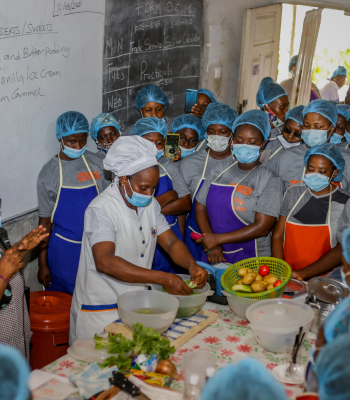
Food For All Africa's vocational program provides single mothers and youth with a variety of apprenticeship trainings to increase employment in Ghana. A group of women attend a culinary training to obtain jobs in the school food service and hospitality industry. (Photo: Food For All Africa)
COVID-19. The invasion of Ukraine. Skyrocketing food prices. We are operating in uncertain territory as we face a mounting global hunger and cost-of-living crisis that shows no signs of ending soon.
But food banks remain a time-tested means for hunger relief.
The close of FY2022 saw the end of our three-year strategy, and the launch of our new four-year strategy, which will run from FY2023-2026. This plan will help us move even closer to our North Star goal by building member resilience and effectiveness, expanding our reach and depth in emerging and developing markets, and leveraging the food bank model to improve food systems.
As the past few years have demonstrated, despite the best planning, some challenges are impossible to anticipate. However, we have also seen that our food bank Network is robust and adaptable, perhaps all the more so due to these unanticipated challenges.
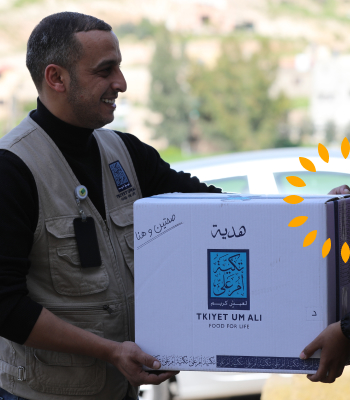
A staff member from Tkiyet Um Ali distributes a food parcel with one month's worth of food to a community member in Jordan. (Photo: Tkiyet Um Ali)
GFN is proud to stand alongside this strong, innovative global Network.
We believe more firmly than ever that locally led; community-based food banks are key to sustainable food systems that are equipped to meet the challenges that lie ahead. To our supporters and partners—thank you. Your engagement is crucial to building a world where everyone can consistently access nutritious food.
06
Our Global Network
Africa
Botswana
Food Bank Botswana Trust
Ethiopia
It Rains Food Bank of Ethiopia
Ghana
Food For All Africa
Guinea-Bissau
Banco Alimentar Conra Fome - Guiné-Bissau*
Kenya
Food Banking Kenya
Madagascar
Banque Alimentaire de Madagascar
Mozambique
Banco de Alimentos de Mocambique*
Nigeria
Lagos Food Bank Initiative
Nigeria
No Hunger Food Bank*
South Africa
FoodForward South Africa
Asia
China
Green Food Bank
Hong Kong
Feeding Hong Kong
India
No Food Waste
India
India FoodBanking Network
India
Feeding India by Zomato
Indonesia
Aksata Pangan Indonesia*
Indonesia
FoodCycle Indonesia
Indonesia
Scholars of Sustenance Indonesia
Malaysia
Kechara Soup Kitchen
Philippines
Rise Against Hunger Philippines
Singapore
The Food Bank Singapore, Ltd.
South Korea
Korea Foodbank
Sri Lanka
Kadamandiya Food Bank*
Taiwan
Taiwan People’s Food Bank Association
Thailand
Scholars of Sustenace Thailand
Vietnam
Foodbank Việt Nam
Europe
Bulgaria
Bulgarian Food Bank
Russia
Foodbank Rus
United Kingdom
FareShare
Latin America and the Caribbean
Argentina
Red Argentina de Bancos de Alimentos
Bolivia
Banco de Alimentos Bolivia
Brazil
Mesa Brasil - SESC
Chile
Red de Alimentos
Colombia
Asociación de Bancos de Alimentos de Colombia
Costa Rica
Banco de Alimentos de Costa Rica
Dominican Republic
Banco de Alimentos República Dominicana
Ecuador
Banco de Alimentos Diakonía
Ecuador
Banco de Alimentos Quito
El Salvador
Banco de Alimentos El Salvador
Guatemala
Banco de Alimentos de Guatemala
Guatemala
Desarrollo en Movimiento
Honduras
Banco de Alimentos Honduras
Mexico
Bancos de Alimentos de México
Nicaragua
Fundación Banco de Alimentos Nicaragua
Panama
Banco de Alimentos Panamá
Paraguay
Fundación Banco de Alimentos Paraguay
Peru
Banco de Alimentos Perú
Uruguay
Banco de Alimentos Uruguay
Middle East
Israel
Leket Israel
Jordan
Tkiyet Um Ali
Turkey
TIDER
North America
Canada
Food Banks Canada
Oceania
Australia
Foodbank Australia
New Zealand
Foodbank Aotearoa New Zealand
“As sustainable food systems are vital to end hunger; food banks play an essential role in the sustainability of those food systems. Hunger and malnutrition are barriers to sustainable development; hungry and malnourished individuals are less productive and are more likely to suffer from chronic diseases. Aiming at reaching its vision of a hunger-free Jordan, Tkiyet Um Ali is a proud member of The Global FoodBanking Network working alongside other food banks aiming to reduce hunger globally.”
07
Our FY2022 Financial Overview
We close FY2022 in good financial health. Our organization received an unqualified opinion on our annual audit. Please find the following information on how we are stewarding donor investments to advance global hunger relief through food banking. Information is drawn from our Audited Financials for the years FY2020, FY2021, and FY2022, which are available at foodbanking.org.
FY2020-2022
Functional Expenses
FY2022
Functional Expenses
Statements of Financial Position
FY2022 Statement of Activities
08
FY 2022
Donor List
Thank you to our generous partners who are powering community-led solutions for hunger relief.
Corporations, Foundations & Organizations
Individuals
In Honor
In Memory
2022
Our Board and Corporate Officers
Board of Directors
Corporate Officers
Full FY2022 Annual Report
downloadreport


